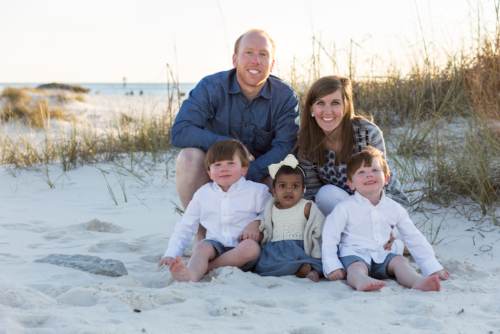“A picture is worth a thousand words,” as the adage goes. If so, I wonder what the exchange costs us? It’s true that a pageful of words can’t provide clarity like an image. Assume, for example, your next door neighbor loses her cat, Mr. Bigglesworth. While cats are unquestionably a result of the Fall, your neighbor loves her cat. So you agree to help. In your search for Mr. Bigglesworth, which would be more helpful: a two (or three or four) paragraph description or a picture? Right.
There’s a trade-off for this clarity, however. Pictures aren’t accurate representations of reality. I’ll use my family as an example.
We recently spent a week at the beach. One afternoon a photographer came out to take snap a few family pictures. I’ve taken beach pics more times than I can count, but this time was different. We were taking our first family pictures with our adopted daughter, Jannie Rose. That’s what I was told, at least.
In less than 48 hours, we could view our pictures online. Social media was quickly and wholly overtaken by Powell family beach pics. It was aI want to share one with you, just in case your timeline somehow evaded them.

Every child is looking at the camera and smiling. The sun is setting in the background. The ocean is visible, but not too visible. Some beachy grass adds a hint of ruggedness. Picturesque, would you say?
Not hardly. Just moments before this picture was taken, all five Powells were complaining like school kids. The temperature was about 60, but it felt like 30. The wind was steady, 20 knots at least. I’m not even sure how fast that is, but it doesn’t matter. I’m making a point. Jannie Rose’s lips were a dull blue color. I was hangry and no longer thinking clearly. Somehow, the photographer convinced us to strike a few more poses. We begrudgingly agreed. This picture was one of the last few.
What you see above isn’t reality. But you don’t know that. When you look at the picture, you see five smiling faces. You don’t see what happened moments before, when I said unkind words under my breath. You also don’t see what happened immediately after, when I instinctively ran to the car, forgetting my oldest son was following me. Fortunately, a nice old couple consoled him until his mom got there.
I would say this whole story is an outlier. But it’s really not. This is life for the Powells. We have beautiful moments. We also have bad ones. Some days our kids are kind and obedient, making Tiffani and I feel like awesome parents. Other days, for no justifiable reason, they obey nothing we say. Like 0%. Tiffani and I go through seasons when our marriage thrives. We also have days that aren’t so good.
This is life. This is reality, for all of us. Sometimes we have it together, but most of the time life’s messy. Some days, we’re standing on top of the mountain. But we never arrive at life’s summit without traveling through the valley. And our time at the top is short.
We live in a world where it’s possible to crop and filter the parts of our lives we don’t others to see. It’s possible to project an image of ourselves and our family that is very far from reality. This is the reality of social media. But it’s not reality, if that makes sense. I used “reality” too many times in this paragraph. I probably need an editor or something.
Anyway, all this filtering and projecting creates a situation where we compare real lives to other people’s filtered ones. This is destined to breed shame.
If you compare your real life to other people’s filtered one, you will always fall short.
I struggle with this, I’ll admit. Some days, the steady stream of smiling faces leaves me with a nagging sense that something’s wrong with me.
This is where social media goes from productive to harmful, when it starts to redefine reality and challenge your identity.
What you see online is half-truth. The truth is we’re all human. Flaws are part of what it means to be human. Mistakes are an inevitable by-product of interacting with other flawed people.
There’s an incredible amount of power and potential for growth when you stop projecting a filtered life and with confidence say, “This is who I am. This is my family.”
This is us. We’re not perfect. And that’s okay.
As Christians, there are two helpful places to turn when we’re struggling with this perspective: Scripture and community.
The Bible is chopped full of relational dysfunction. The breadth and pervasiveness of it is almost comical. The first mention of brothers (Cain and Abel) in the Bible comes in the first chapters of Genesis. It ends with one brother killing the other.
Father Abraham had many sons. But he was 100 years old before he had one. Naturally, his wife didn’t believe she would have a child, so she asked Abraham to have a baby with her maid, which he did.
In Genesis 19, Lot’s daughters get him drunk (two different times) so they can have sex with him and carry on the family name. Wait, what?
The Bible is clearly not concerned with projecting an image of the perfect marriage or family. There’s story after story of broken relationships, infidelity, and faulty parenting. You name the problem, it’s somewhere in Scripture.
What you do see, however, throughout the Bible are men and women who continue to seek God with unwavering hope and faith. Through the mistakes and struggles, they trust their Creator. And this, I believe, is what we must do. We will make mistakes. We will say and do things we regret. We will struggle through certain seasons of life. But we must continue to seek God and trust he will use it all for some eventual good, even the parts we don’t want others to see.
Then there’s community. Christian community is a powerful antidote to the false realities created by filtered images. When we gather in people’s homes and share our lives with other believers, the temptation to project an image or live up to one loses its sting. People know you. They know the messy parts, too. Yet, the community accepts you. They love you. In Christian community, everyone realizes the goal of this life isn’t to be flawless or mistake-free. The goal is to keep moving forward, towards God, towards a more Christ-centered life.
You and I long to be fully known and fully loved. This is one of our greatest desires. But something in us doesn’t believe this is possible. That’s why so many people project images and why, in part, social media is so popular. We assume we can fill our heart’s desire to be fully loved while being partially known. And it doesn’t work.
This is why the narratives in the Bible matter, why Christian community is transformative and why we must embrace our fully humanity. This desire to be fully known and fully loved also explains why God’s stance towards us is so radical. He knows our every thought, yet there is nothing but love. He knows every mistake, yet there is nothing but unconditional acceptance.
Ultimately, the idealized images of success, marriage, family, etc. aren’t going anywhere. Neither is social media. As we engage the digital culture, let’s not forget who we are and why we’re loved by our Creator.
This is us. And that’s enough.
Grace and peace, friends.


Kathleen armstrong
Great blog. Is this fairly new? I haven’t seen it until now, but have watched many bayside podcasts and videos. I Really like this personal touch.
Frank Powell
Kathleen, we launched the blog in January, so yes, it’s new. Thanks for the kind words! Blessings!
Bob Willson
This is so powerful & true.